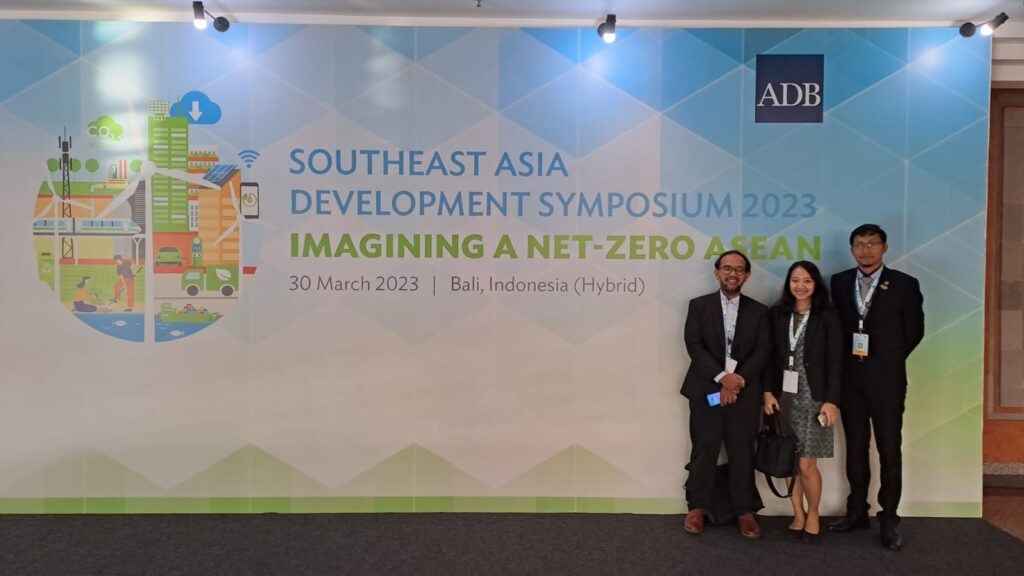Menu
ACCEPT II representative, Muhammad Shidiq has joined a one-day event of ADB SEADS 2023 on Thursday, 30 March 2023 in Nusa Dua Bali, Indonesia.
The SEADS 2023 is the first time the symposium has been held again as in-person since the event was launched in 2020. Masatsugu Asakawa as ADB president has delivered welcoming remarks. He welcomed all participants both in-person and virtual where the event has brought together leaders from government, industry, academia, and other sectors to explore innovative solutions to critical development issues such as climate change and technology development. The theme on Imagine a net-zero ASEAN focused on how the region can transition to net zero and achieve climate resilience, while ensuring economic prosperity. SEADS 2023 aimed to build on the priorities and successes of the G20 summit and contribute to the dialogue at the 2023 ASEAN Finance Ministers Meeting.
An opening keynote has been delivered by Sri Mulyani Indrawati as Minister of Finance of Indonesia. Sri Mulyani highlighted that Indonesia has an enhanced Nationally Determined Contribution (NDC) from 29% to 31.89% by unconditional and from 41% to 43.2% by conditional. She mentioned that Indonesia participation in the ASEAN net zero achievement is crucial since Indonesia is the largest economy in ASEAN so that the Indonesia’s role is strongly relevant and important. One way to achieve the net zero by 2060 or sooner is through reducing and or phasing out coal power plant step by step. Financing is critical for achieving the net zero. The total climate financing needed to achieve the NDC is around IDR 4,000 trillion or USD 281 billion by 2030 which will be met with public and private investment. The minister has also mentioned the Indonesian government has issued a number of fiscal incentives as well as financing innovations to bridge the gap and create a catalyst fund for investment in green projects among others including the use of tax holidays, tax allowances, VAT facilities, import duties, and property taxes. In addition, Green Sukuk and SDG bonds both at the global and domestic levels, as well as issued a regulatory and legal framework on carbon pricing and introduced a carbon tax have been issued by Indonesian government also.
After the opening remarks, a session on financing net zero has been conducted by inviting speakers from different institutions ranging from government bank, private bank, banking sector, financial institution, philanthropy, and private sector. The discussion highlighted that improving access to finance is key challenge; collaboration among partners and stakeholders are crucial; clear regulatory framework must be there to regulate the financial scheme; funding focusing on retiring the coal power plant should be inclined; and new technologies with digitalization must be implemented in this current era to boost the net zero financing in ASEAN. One of the most interesting discussions was also on neutral platform for financing net zero in ASEAN. The idea of neutral platform is to create a mixed capital with a clear regulatory framework on each role of stakeholders that should fund together the net zero activities by involving any stakeholders (government, industries, bank, and financial institution).

Figure 1. ACCEPT II representative (Muhammad Shidiq, left), GIZ Colleague (Melati Wulandari, middle) and ACE MPP Manager (Dr Zulfikar Yurnaidi, right) at the ADB SEADS 2023
In the first thematic session on Enabling Energy Transition in Southeast Asia: Mechanisms and Initiatives, Dr Zulfikar Yurnaidi delivered a scene setter by presenting the 7th ASEAN Energy Outlook (AEO) to inform the current energy supply and demand projections in ASEAN. After the presentation, the discussion has been conducted by inviting five speakers from ADB, Infrastructure Asia, Black & Veatch, ACEN Corporation and Carbon Trust. The session has been moderated by Desi Anwar as Director and Senior Anchor at CNN Indonesia. The discussion highlighted that ASEAN net zero required large scale deployment of renewable energy and energy efficiency, good infrastructure on grid interconnection, retirement coal power plant, industry involvement on net zero target, as well as international funding support such as Energy Transition Mechanism (ETM) and Just Energy Transition Partnership (JETP). Besides, the discussion has also highlighted the most challenging part for ASEAN to achieve net zero were unclear regulatory framework and business model on doing renewable energy in emerging economies, technology barriers such as lack of understanding on digitalization, difficulties on access to financing for rural areas, and lack of capacity building on net zero in ASEAN.
In the second thematic session on Opportunities for Transitions and Decarbonization Pathways in Southeast Asia moderated by Sean Kidney as CEO of Climate Bonds Initiative, the speakers from Glasgow Financial Alliance for Net Zero, Ninety One, ADB, Norinchukin Bank, and the Coordinating Minister of Maritime and Investment Affairs of Indonesia highlighted that ASEAN has a great opportunity to transition its energy into renewable energy and decarbonize its energy sector. It could be doable since the region has abundant of renewable energy resources, access to international financing support such as ETM and JETP, and enhance NDCs in several countries showing the renewable energy progress and decarbonization process are on the way. However, the region should also think on how to manage the process of early coal power plant retirement and how to strategize to alter its retirement with more renewable energy deployment. In addition, a good and sustainable maintenance on the grid interconnection should be also considered to keep net zero on the target.
Detailed information on ACCEPT II: https://accept.aseanenergy.org/.
For any collaborations with ACCEPT II: [email protected]
